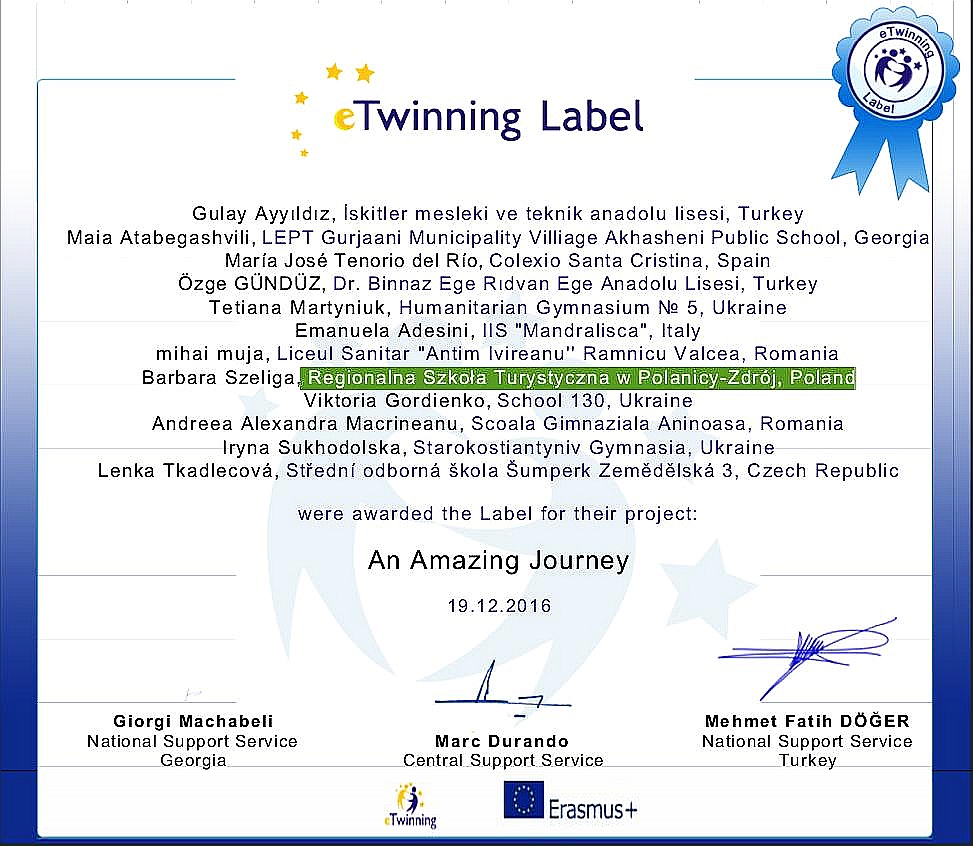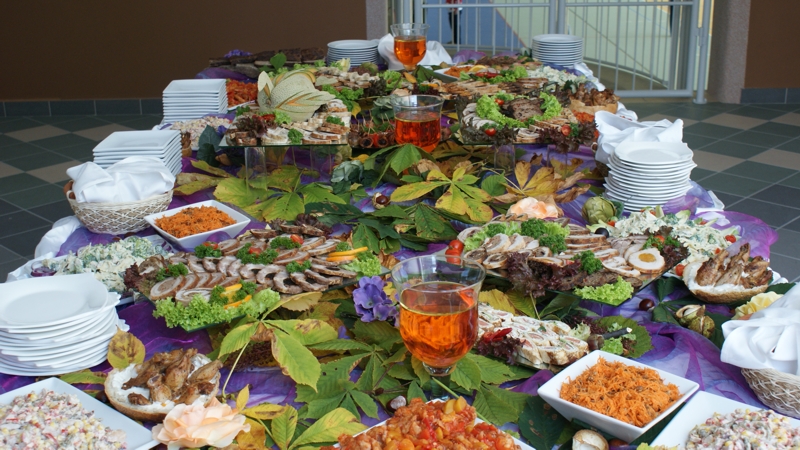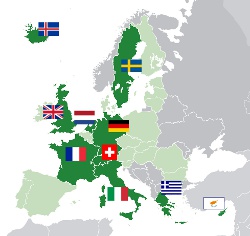"An Amazing Journey" Projekt Międzynarodowy (international project eTwinning)
- Details
- Written by Barbara Szeliga
AN AMAZING JOURNEY within eTwinning platform
WITH SCHOOLS FROM:
SPAIN, TURKEY, ITALY, UKRAINE, GEORGIA, the CZECH REPUBLIC

WHAT IS THE PROJECT ABOUT?
Students will find out historical facts, geographical location and nature, interesting places, famous artists and traditional cuisine(they will make some traditional dishes) of their countries. They will also make videos and slides, presentations.
Aims to gain
Information-retrieval skills developing, information sorting skills developing, presentation skills training, interviewing skills developing, proper using of the Internet and technologies, developing of cooperative skills. Get to know interesting facts about own and other countries, making similarities and differences between the cultures.
Expected results
The students will develop the following skills: finding out information, interviewing, making presentations, using technologies. They will learn teamwork, co-working and become more sociable. They can compare their culture with others, make similarities and differences. They will learn how to organize a tour, how to make videos or slides. They will learn how to make projects with helping information technology.
Work process
February:
- Introducing, greeting the participating schools. (Submission of school can be implemented in any form – video, presentation of school and students photos, maps, Skype or other.)
- The logo design. (The students will work on the creation of logo, which would be a symbol of friendship between countries, the best will become the main logo.)
March:
- Introducing countries with their geographical location and peculiarity, attractions.
- Find out and share interesting or important facts from history of their countries.
May:
- Introducing attractive and historical places. Arranging trips and making videos or presentations.
October:
- About Art (painting, theater, cinema, music, etc.)
November:
- "Well-known people of my country.''
December:
- "Traditional cuisine of my country.'' (Share some recipes of traditional dishes.)
- "New year traditions in my country.''
February:
- Making e-book about countries with materials of project.
Creative tables and buffets
- Details
Our students are also trained to pay attention to every detail which may make the guest happy and comfortable.
A special table says that the restaurant really values its guests when they make the extra effort to set the table beautifully.
A beautifully set table is enhanced when we learn some simple napkin folding skills.
The future waitress at our school has taken the time to make the table look really special.
Some napkins are arranged so beautifully that some don't want to use them.
We know that the napkins, folded to a pretty shape, add to the total feel of the setting.
There are some samples of our students studies on decorating classes:

Vocational trainings policy
- Details
 We are aware of the necessity of close corelation between theoretical knowledge gaining at our school and practical training here at Polish hotels and what is more at hotels abroad.
We are aware of the necessity of close corelation between theoretical knowledge gaining at our school and practical training here at Polish hotels and what is more at hotels abroad.
We have been exploring the international hotel market since 2004. Our first destination was Cyprus then Italy, Greece, Great Britain, France, Holland, Switzerland, Germany and Iceland.
After many years of experience on that field, we can say that the idea works well either for our students or for the employers.
Our students train useful skills as room maids, waiters/ waitresses and kitchen staff.
The hotels where the students are sent are carefully chosen and checked.
The school classes and tutorials at our school lasts from September till June. The training programme it is a very important part of the programme of the school and usually taking part after the fulfillment of the classes. The students are offered to participate in the training summer programme as part of their studies.
The authorized contact person representing Regional School of Tourism is : Beata Dreszer – the head teacher
The head teacher entitled the following teachers as the supervisors responsible for contacts with:
- Englishspoken employers - Barbara Szeliga This email address is being protected from spambots. You need JavaScript enabled to view it.
- Frenchspoken employers - Magdalena Bregin This email address is being protected from spambots. You need JavaScript enabled to view it.
- Germanspoken employers - Barbara Prusak This email address is being protected from spambots. You need JavaScript enabled to view it.
Overal description of the training terms provided by an employer and a trainee:
The student is provided by the hotel full board ( 3 meals per day) and accommodation (participating in costs of transfer
is negotiated according to each destination)
The employer is obliged to pay the student compensatory money of 180 hours working per month (details in trainee's contract).
The students are only engaged for tasks and exercises strictly reserved to professional educational trainning. The trainee is entrusted with duties in order to develop the sense of responsibility and ensure the professional development. The student does his best to come up to the eployer's expectations
Trainees are fully inssured by THE EUROPEAN HEALTH CARD .
We do confirm that our school is a Polish State Accredited School .
Why the Regional School of Tourism is so special?
- Details
Regional School of Tourism in Polanica Zdroj is 4-year secondary, technical , state school which annually gives education to about 400 students in wide range of tourist industry as well as hotel and catering. The knowledge and abilities gained here help to work in tourist industry and prepare to start an own business in this area.
We do our best to make every student a professional.
We cooperate with our region in order to integrate our students with the local environment as well as with foreign countries in Europe such as England, Greece, France, Germany, Italy, Iceland, Switzerland, Cyprus providing vocational training there in order to improve the students’ English level. The school tries to respond to the needs of region and EU standards.
________________________________________
More about us
The south-west part of Poland, where the Regional School of Tourism is located, is quite essential for Polish tourist industry. Our aim is to identify our students with local environment, encourage them to make positive changes and create new traditions. The RST was founded 16 years ago as a result of the needs of our region.
Regional School of Tourism is situated in Polanica Zdroj, in south-western part of Poland about 100 km away to the airport in Wroclaw and 170 km to the airport in Prague and it occupies a part of a new, modern and spacious building. The 2-floor school building consists many classrooms used for general and professional education, computer studios, office work studio, tourist geography studio, client and consumer studio, library, canteen, didactic kitchen. We plan to set up a youth hostel which could serve us as a didactic hotel with reception and tourist information.
The aims of general and professional education

Our graduates are well prepared to continue their education at university or college. We try to keep a correlation between general and professional education. While teaching general subjects we try to stress the knowledge and abilities which may be helpful in tourist industry. It especially concerns such subjects as: ICT, foreign languages Polish lessons stress the ability of making a polite conversation, expressing your own opinions without offending others, writing advertising and promoting texts. Teaching foreign languages stresses ability of making a conversation in situations which are typical for tourist industry. We provide a lot of opportunities for our students to gain experience and practice what they are taught. A didactic process emphasizes practical skills and knowledge. We run our workshop in a school canteen and a modern kitchen, didactic receptions, hotel’s room, travel office etc. In the future it will be also possible to use our small hotel in this way. First students develop their skills in a school environment then they can practice them outside.
________________________________________
Our history and present time
The Regional School of Tourism was founded on the 1st October 1995 to give professionals to the tourist industry all over the region. Tourism has become the most dynamic branch of industry in our country. We have many good conditions for development of tourism such as:
- various touristic attractions
- environmental friendly area without any industry
but there are also some destructive factors like:
- lack of proper skills in English language presented by staff employed in tourist industry
- poor usage of computer technologies in workplaces in the area
- lack of promotion
- lack of proper staff qualification
The Regional School of Tourism desires to act against these factors through:
- preparing for work in tourist industry by giving proper education, on the European level
- preparing potential manufacturers for tourist industry
- making the quality of service higher
- giving possibility to students to continue their education on the university level
- training abroad in carefully selected hotels and restaurants
Vocational training policy:
Industry training is an integral part of the study program at our school. During the second year the school provides lasted two weeks or a month non-paid work experience in carefully chosen regional and Polish hospitality venues. Successful students may assume more responsibility in their third school year, for whom our school provides paid work training on Unity Line Ferry and hotels abroad. We have been already cooperating with the following countries: England, Italy, Holland, Greece, Germany, France, Iceland, Cyprus.
To be accepted for trainings abroad students are expected to meet the requirements of the school, which are personal attitude points, classroom attendance, a minimum grade point average and quite good language skills. Most of the students meet these criteria.


